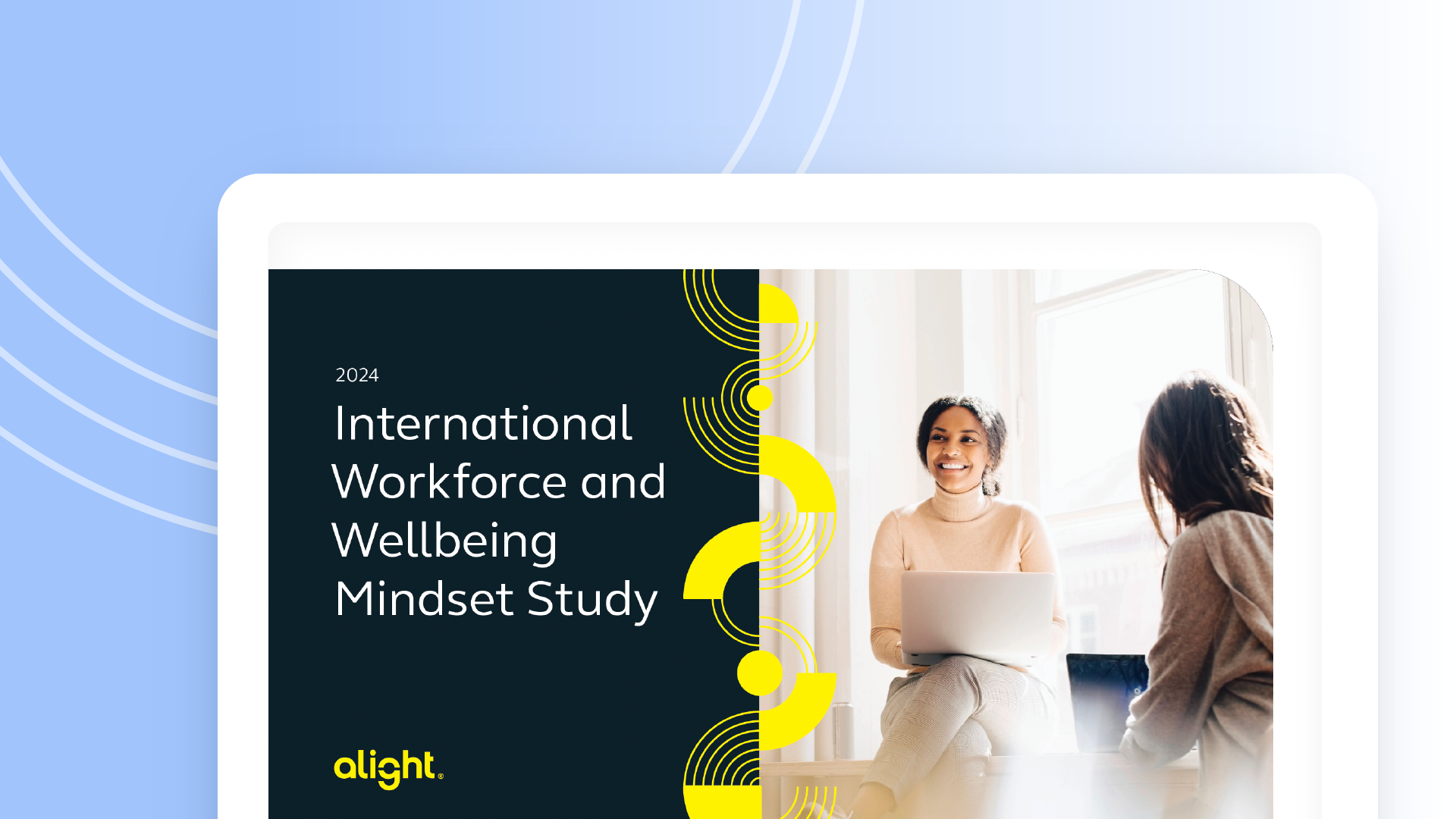
Burnout is more than just an individual struggle — it’s an organizational challenge that impacts productivity, absenteeism and employee engagement.
Employers are looking for a unified benefits solution to address this challenge. However, many benefits strategies still address workplace stressors in isolation, leaving employees to navigate a maze of point solutions that don’t work together.
At Alight’s recent webinar, Transforming Workplace Burnout into Work-Life Balance, industry leaders from Cariloop, Hinge Health, Pelago, Journey and Alight shared how taking a holistic approach to wellbeing can help employees overcome burnout and regain balance.
Through the stories of two employees, Carol and Mike, we explored the importance of unified benefits ecosystems and proactive outreach in driving meaningful, lasting change.
Carol’s story: The sandwich generation struggle
Carol is a devoted mother and daughter caught between the demands of caregiving and financial pressures. As she juggles her aging mother’s dementia care and her daughter’s rising college expenses, stress takes a toll, leading to unhealthy coping mechanisms, including increased alcohol use. Over time, Carol’s burnout impacts her ability to focus at work, leading to higher absenteeism and lower engagement.

Fortunately, Carol’s employer offers a unified benefits ecosystem that provides critical support across multiple dimensions, all through the Alight Worklife® platform:
- Caregiving Assistance — Carol logs onto the Alight Worklife platform and connects with Cariloop, which provides personalized caregiving support, from elder care planning to financial guidance for her daughter’s college expenses.
- Mental Health Support — Proactive AI outreach through Alight Worklife helps Carol find Journey, which educates her on how to recognize signs of stress. Journey also helps Carol engage with virtual therapy and group coaching.
- Substance Use Management — Alight Worklife guides Carol to access Pelago’s virtual care model, where she finds confidential support, behavioral therapy and evidence-based treatment to reduce alcohol dependency.
- Musculoskeletal Health — After working extra shifts, Carol experiences severe back pain. Alight Worklife, recognizing that Carol has been working extra hours, proactively recommends Hinge Health’s digital physical therapy. Hinge provides accessible solutions that fit into Carol’s demanding schedule but still allow her to get her back pain under control.
Through seamless integration of data-driven benefits and AI-powered outreach, Carol is able to address her wellbeing challenges holistically, regain control, and maintain both her professional and personal responsibilities.
Mike’s story: Recovering while returning to work
Mike, a former athlete, recently underwent knee surgery, but his recovery didn’t go as planned. Struggling with opioid reliance, childcare concerns and workplace reintegration, Mike faces mounting stress and uncertainty.
His employer recognizes his wellbeing challenges and leverages a connected benefits ecosystem through Alight Worklife to support his journey:

- Post-Op Recovery & Physical Therapy — Alight Worklife recognizes that Mike just had surgery and proactively recommends Hinge Health’s virtual MSK care. This enables Mike to access digital physical therapy and focus on his recovery without missing work.
- Medication-Assisted Treatment — AI outreach from Alight Worklife connects Mike to Pelago, where he receives clinically supported opioid use treatment while balancing family and work life.
- Childcare Support — Recognizing that Mike is returning to the office, Alight Worklife suggests Cariloop to assist with his childcare needs. Cariloop’s care team helps Mike navigate childcare options, ensuring he has reliable support while returning to the office.
- Resilience Building & Mental Health Coaching — Analyzing Mike’s current wellbeing needs, Alight Worklife proactively guides him to Journey to provide tailored mental health resources, equipping Mike with the strategies needed to manage stress and avoid setbacks.
By unifying benefits access through Alight Worklife, Mike’s employer removes complexity, stigma and administrative barriers, creating a supportive environment that promotes long-term wellbeing.
The business case for unified benefits
For employers, connected benefits aren’t just about wellbeing — they drive real return on investment. When employees like Carol and Mike receive proactive, AI-driven outreach and holistic care, companies see measurable ROI through:
✔ Reduced absenteeism & turnover
✔ Lower healthcare costs
✔ Higher employee engagement & productivity
According to Alight’s 2024 International Workforce and Wellbeing Mindset Study, 58% of employees regret a healthcare decision they’ve made, often due to lack of clarity about their available benefits. Empowering employees through seamless benefits experiences improves engagement, satisfaction, and ultimately, business performance.

2024 Alight International Workforce and Wellbeing Mindset Study
The study’s goal is to understand employee perceptions to help employers optimize their employees’ wellbeing and experiences to improve engagement, productivity and performance.
From burnout to balance: What’s next?
Workplace benefits will continue to move away from siloed point solutions, and toward unified models that offer employees easy access to their benefits and personalized recommendations. By leveraging AI-powered benefits ecosystems, employers can predict needs, reduce complexity and create a truly supportive work environment.
Want to learn more about optimizing your benefits strategy? Explore Alight’s latest insights and case studies or connect with our experts today.

Alight Worklife
Transform Employee Experience with the Alight Worklife® Platform
Connect health, wealth, payroll and leaves in one place to cut complexities and empower your workforce with Alight Worklife’s integrated and AI-powered cloud platform.


